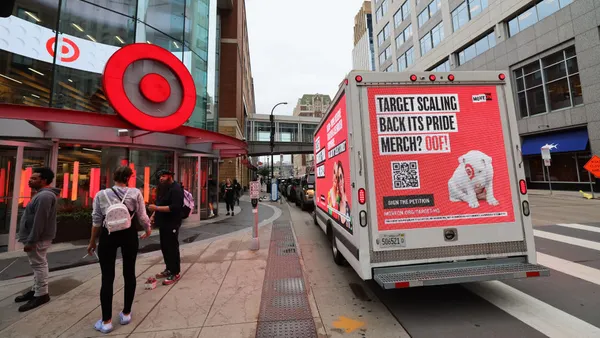Dive Brief:
- Global spending on cognitive and artificial intelligence systems is projected to reach $19.1 billion in 2018, a 54.2% increase over 2017. By 2021, spending is expected to reach $52.2 billion and a compound annual growth rate of 46.2% from the period 2016 to 2021, according to the International Data Corporation World Semiannual Cognitive Artificial Intelligence Systems Spending Guide, per a press release.
- Retail is projected to become the industry leader in cognitive/AI spending in 2018, with retailers investing $3.4 billion on a range of AI systems, including automated customer service agents, shopping advisers, product recommendations and merchandising for omnichannel operations. The banking industry will spend $3.3 billion on automated threat intelligence, fraud analysis and investigation and program advisers and recommendations. Discrete manufacturing will spend $2 billion on automated preventative maintenance and quality management investigation and recommendation. Health care will invest $1.7 billion in AI-powered diagnosis and treatment systems.
- The cognitive/AI use cases with the most spending in 2018 will be automated customer service agents at $2.4 billion. Automated threat intelligence and prevention systems will make up $1.5 billion. Sales process recommendation and automation will account for $1.45 billion.
Dive Insight:
IDC's findings raise the question of whether AI can be a salve for traditional retailers, which have been struggling as a record number of stores close and/or declare bankruptcy. One of the issues facing retailers is the need to provide more personalized omnichannel experiences as digital shopping grows, something AI could conceivably support. The challenge for retailers will be in retaining the human touch that differentiates brick-and-mortar stores from online shopping while enhancing AI-driven services that shoppers want.
More broadly, marketers across industry segments are interested in AI for its ability to crunch large volumes of data. But, here again, the trick will be in figuring out how to turn the insights into meaning services for customers. The top investments for cognitive/AI systems in 2018 — customer service, public safety, preventative maintenance, anti-fraud and health care diagnosis — are just the beginning for what’s possible with the technology and what will drive spending in the future. The IDC guide notes that the use cases with the quickest growth in spending over the 2016-2021 forecast period will be public safety and emergency response at a 75.4% compounded annual growth rate (CAGR), pharmaceutical research and discovery at 70.5% CAGR and expert shopping advisers and product recommendations at 67.3% CAGR.
“Interest and awareness of AI is at a fever pitch. Every industry and every organization should be evaluating AI to see how it will affect their business processes and go-to-market efficiencies,” David Schubmehl, research director, Cognitive/Artificial Intelligence Systems at IDC, said in a statement.
Twenty percent of firms will use AI to make business decisions and offer customer service and sales support in 2018, Forrester predicts, which also suggests that AI will be increasingly used for visual-based technologies, like image detection and facial expression analysis. Emirates Vacations is one brand that has found success with AI-powered marketing campaigns. The company launched digital display ads with AI-powered chatbots that answer travel questions, and during a 30-day test, saw an 87% engagement lift over its average click-through rates.
The IDC report also estimates that 40% of digital transformation initiatives will use AI by 2019, and 75% of enterprise applications will use the technology by 2021. Just over half of all cognitive/AI spending will be on cognitive software that automatically learns, discovers and makes recommendations, and cognitive platforms that foster the development of intelligent, advisory and cognitively enabled apps. Hardware needed to support the systems will make up the smallest spending category.












